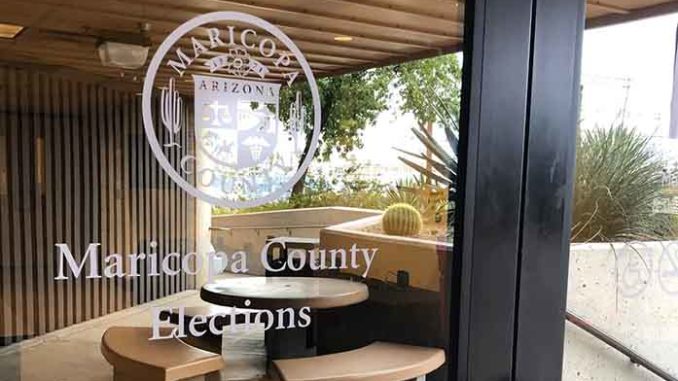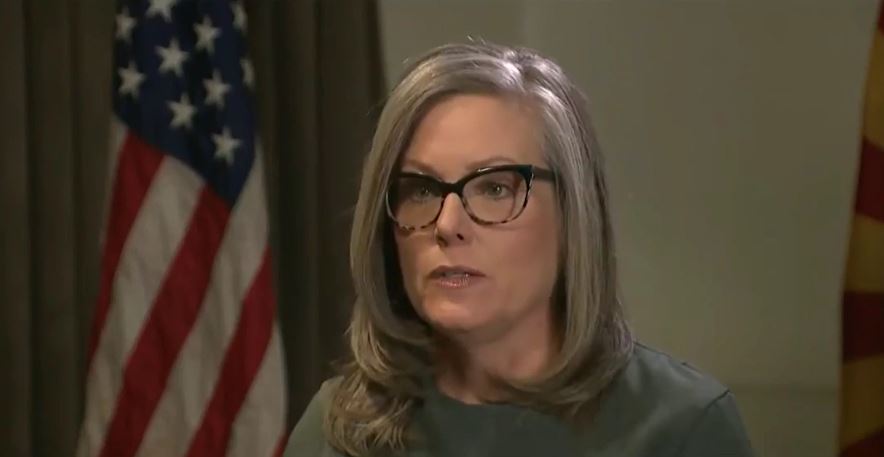
by Ethan Faverino | Feb 7, 2026 | News
By Ethan Faverino |
On Friday, Arizona Governor Katie Hobbs signed a Republican bill passed on a bipartisan vote by the Arizona Legislature to change the date of the 2026 primary and permanently move Arizona primaries to the second to last Tuesday in July.
The legislation permanently shifts the primary election date earlier, ensures timely ballot access for military voters overseas, and mandates clearer guidelines for political party observers at polling sites, marking a significant step toward greater election integrity and consistency ahead of the 2026 election cycle.
HB 2022 addresses longstanding issues with Arizona’s election calendar by moving the primary from August 4 to the second-to-last Tuesday in July – specifically July 21 for 2026.
This two-week adjustment resolves conflicts with federal requirements under the Uniformed and Overseas Citizens Absentee Voting Act (UOCAVA), which mandates that ballots be sent to military and overseas voters at least 45 days before an election. Previously, Arizona’s timeline risked delays, potentially disenfranchising service members.
By advancing the date, the bill ensures that ballots are mailed on time, giving voters abroad ample time to receive, complete, and return them.
The measure also enhances transparency and oversight by explicitly requiring authorized political party observers to be permitted at all voting locations, including early voting centers and emergency voting sites.
The bill was sponosored by Rep. Alexander Kolodin (R-LD3) with a mirrored bill (SB 1425) sponsored in the Arizona Senate by Sen. Wendy Rogers (R-LD7).
“Arizona law has always intended to protect the integrity of our elections, including for military voters and at ALL voting locations,” said Rep. Kolodin. “I am delighted that Governor Hobbs agreed with me that this commonsense reform and legislation is necessary.”
“This was a unified Republican effort leading the way from start to finish,” Senator Rogers added. “By working together across chambers, we delivered a commonsense election bill that protects military voters, brings clarity to our election calendar, and strengthens transparency for Arizona voters. This is how the process should work.”
New voter deadlines are as follows:
- Voter Registration Deadline: June 22, 2026
- Ballots are mailed to voters on the Active Early Voter List and In-Person Early Voting Begins: June 24, 2026
- Primary Election Day: July 21, 2026
The Primary date change also impacts filing deadlines for candidates running for office.
Filing Dates:
- Partisan Primary Candidate Filing: Feb. 21, 2026 – March 23, 2026
- Precinct Committeemen Write-In Deadline: April 6, 2026
- Write-In Candidate Filing Deadline: May 22, 2026
The measure had the full support of the Arizona Freedom Caucus (AFC). In a statement, AFC Chairman Senator Jake Hoffman (R-LD15) said, “Governor Hobbs signing Representative Kolodin’s HB 2022 is a huge win for election integirty in Arizona. While Adrian Fontes is making radical and unserious legislative proposals, like expanding unaccountable, sprawling voting centers and reinstating a permanent early voter list, Representative Kolodin is leading with bipartisan supermajorities.”
Ethan Faverino is a reporter for AZ Free News. You can send him news tips using this link.

by Staff Reporter | Feb 7, 2026 | News
By Staff Reporter |
In the latest escalation between Maricopa County leaders’ legal jockeying for elections authority, the Board of Supervisors reportedly subpoenaed staff with the Recorder’s Office.
Recorder Justin Heap issued a statement on Tuesday accusing the board of attempting “to intimidate and bully” his staff and “unduly influence” the pending court ruling. The recorder and board have been fighting for months in the Maricopa County Superior Court over who has proper authority over which elections administration powers.
“Their actions are beyond inappropriate,” said Heap. “My staff has bent over backwards to work with the Board, yet despite our earnest efforts the Board continues to engage in unhinged, emotional, and unprofessional behavior.”
Within the hour of Heap’s post, supervisor and former chair Thomas Galvin quoted Scripture that appeared to allude that the truth of the matter was beyond Heap’s remarks.
“‘And you will know the truth, and the truth will make you free.’ – John 8:32,” posted Galvin.
Galvin also shared a video from Chair Kate Brophy McGee addressing the accusations from Heap. McGee said their subpoena concerned an apparent conflict between Heap’s remarks during his annual budget request and sworn testimony on voter disenfranchisement from Heap’s staff, both of which took place last week on separate days.
“At Maricopa County, we count every lawful vote. That’s why we take any claim of disenfranchisement seriously, and have asked the Recorder’s office to provide further testimony regarding conflicting claims recently made by Recorder Heap and his staff,” said McGee. “This is an important issue and we need straight answers. If any voters are being disenfranchised, we will fix it immediately. If not, then the Recorder’s office must clarify to the court why it provided such testimony. Maricopa County voters need the truth.”
During last week’s board hearing, Heap said no voters had been disenfranchised since he took office in January 2025.
“We stated that we want this machine to make sure that we don’t disenfranchise voters. We didn’t say that any voters have been disenfranchised since I took office in the administration,” said Heap.
Two days earlier, Heap’s chief of staff, Sam Stone, issued sworn testimony in the Maricopa County Superior Court that disenfranchisement was occurring in the present.
“We had two potential places we would have made the substantial changes to one or the other to bring this in, to not disenfranchise voters, which is happening now,” said Stone.
Stone directed the court to testimony from Janine Petty, senior director of voter registration, who said disenfranchisement occurred during the 2024 election when certain provisional ballots were processed as federal-only due to time constraints even though they were voted as a full ballot.
“[Those provisional ballots] would be counted, but they would not be afforded the full ballot. So they would be duplicated by the elections board to be a federal ballot, when that voter was entitled a full ballot and voted a full ballot,” said Petty.
Heap earned a legal win on Wednesday against the board after the Maricopa County Superior Court rejected the board’s move to stop America First Legal (AFL) from representing Heap in court going forward.
AFL sued the board on behalf of Heap last summer over the contested elections administration powers, a battle stemming from a “lame duck” agreement between the outgoing recorder, Stephen Richer, and a board majority also on their way out.
AZ Free News is your #1 source for Arizona news and politics. You can send us news tips using this link.

by Matthew Holloway | Feb 7, 2026 | News
By Matthew Holloway |
A slate of bills designed to strengthen oversight of Arizona’s Supplemental Nutrition Assistance Program (SNAP) advanced Monday as House Republicans moved to implement federal reforms enacted under H.R. 1. The bills include new work requirements, stricter eligibility verification, and measures to reduce payment error rates
The actions follow a separate advancement of Medicaid and health-related bills tied to federal H.R. 1 reforms by the Arizona House Health and Human Services Committee, part of a broader state response to changes enacted under the federal budget reconciliation act.
House leaders said the measures correspond to provisions in the federal law signed into effect on July 4, 2025, which included updates to SNAP work requirements, eligibility criteria, and administrative rules.
“H.R. 1 made it clear that work expectations and eligibility rules matter again,” Committee Chairman Rep. Selina Bliss (R-LD1) said. “Our SNAP reforms reinforce responsibility while protecting parents, seniors, and the disabled. This package keeps the program strong so it can continue serving families who qualify and rely on it.”
Key bills advanced under the SNAP reform package include measures to tighten employment and training provisions for SNAP participants, adjust work requirement waivers, and increase data verification for eligibility determinations. The bills advanced with a ‘Do Pass’ recommendation 7-4.
One bill, HB 2206, would require the Arizona Department of Economic Security to reduce the SNAP payment error rate to 3 percent — a target state lawmakers say could reduce improper payments and lower the risk of federal cost-sharing penalties tied to high error rates under H.R. 1.
Failure to act, Republican lawmakers said, could expose Arizona to federal penalties related to improper payments and high error rates, effectively shifting more program costs onto state taxpayers. According to legislative budget estimates, the reduction would save taxpayers tens of millions of dollars annually.
“SNAP should be a hand up, not a blank check,” House Majority Leader Michael Carbone (R-LD25) said. “When benefits flow to people who no longer qualify or who do not even live here, the program is weakened for families who truly need help. These bills tighten eligibility, reinforce work expectations, and protect taxpayers while keeping SNAP available for the vulnerable.”
Mandatory employment and training requirements for certain SNAP recipients are addressed in HB 2442, which would align Arizona law with updated federal work provisions enacted under H.R. 1. The bill requires eligible participants to engage in job readiness, employment, or training activities as a condition of receiving benefits, reflecting federal standards adopted through the reconciliation package.
HB 2448 focuses on waivers and exemptions for work requirements, narrowing the circumstances under which SNAP recipients may be exempted from employment obligations. The legislation responds to federal changes limiting broad waiver authority and seeks to ensure exemptions are applied more narrowly and in accordance with updated eligibility rules.
Expanded eligibility verification requirements for SNAP and other public assistance programs are proposed under HB 2797, which applies additional data checks to confirm income, employment status, residency, and overall eligibility. The bill also directs suspected fraud cases to be referred for further review, including potential federal prosecution.
The committee’s agenda also included adjustments to employment reporting requirements for able-bodied adults without dependents and limits on backdoor waivers unless approved by the Legislature.
Matthew Holloway is a senior reporter for AZ Free News. Follow him on X for his latest stories, or email tips to Matthew@azfreenews.com.

by Staff Reporter | Feb 6, 2026 | News
By Staff Reporter |
Republican lawmakers in the Arizona House are continuing their investigation into Gov. Katie Hobbs over an alleged pay-to-play scheme.
On Monday, House Speaker Steve Montenegro (R-LD29) announced the House advisory team obtained outside counsel from out of state to investigate the connection between Hobbs and a Glendale group home, Sunshine Residential Homes, independently.
Montenegro said in a statement that the connection between the governor and the group home constituted special treatment derived directly from political donations. The lawmaker said that the addition of outside counsel was necessary to achieve the full independence an investigation of this significance needed.
“The advisory team has done serious, disciplined work, and their recommendation to bring in independent counsel is the right next step,” said Montenegro. “The House will not look the other way when taxpayer dollars and vulnerable children may have been used as leverage in a political scheme. We will follow the facts, consider the findings, and ensure transparency and accountability in state government. Arizonans deserve nothing less.”
The outside counsel is Justin Smith with the Missouri-based James Otis Law Group. The law group was founded by Trump’s solicitor general, D. John Sauer.
Smith is the listed counsel in President Donald Trump’s lawsuit against a woman, E. Jean Carroll, alleging battery and defamation. Carroll sued Trump for defamation after he publicly denied her 2019 claims of him sexually assaulting her in the 1990s.
That petition is before the Supreme Court.
According to Montenegro, Smith will conduct records review and interviews. All findings will go directly to the advisory team and House leadership.
Advisory team members are State Reps. Selina Bliss (R-LD1), David Livingston (R-LD28), Matt Gress (R-LD4), Quang Nguyen (R-LD1), and Neal Carter (R-LD15).
Last November, that advisory team was created to follow up on 2024 media reporting alleging the pay-to-play scheme within the Arizona Department of Child Safety under Hobbs’ direction.
In the summer of 2024, the Arizona Republic reported that Sunshine Residential Homes received a unique 30% rate increase following a donation exceeding $400,000 to Hobbs and the Arizona Democratic Party.
Much of 2024 was spent attempting to determine who, if anyone, was fit to conduct an investigation into the allegations against the governor.
One of the earliest requests came from Republican State Sen. T.J. Shope, who asked Attorney General Kris Mayes to investigate. Mayes complied initially, but was immediately hit with other Republican lawmakers and state leaders asking her to recuse herself due to an alleged conflict of interest.
State Rep. Matt Gress asked Maricopa County Attorney Rachel Mitchell and Auditor General Lindsey Perry to investigate.
All three leaders are investigating. Mitchell and Perry are coordinating on one investigation, while Mayes will conduct her own investigation.
As reported last November, the work of the House’s advisory team will coordinate with these parallel investigations by the auditor general and county attorney, and the attorney general.
In February 2024, Sunshine Residential Homes owners Elizabeth and Simon Kottoor maxed out their donations to Hobbs’ reelection campaign. Each gave the maximum $5,400 contribution amount.
In October 2022, the Kottoors gave Hobbs’ initial gubernatorial campaign $10,000.
AZ Free News is your #1 source for Arizona news and politics. You can send us news tips using this link.

by Matthew Holloway | Feb 6, 2026 | Education, News
By Matthew Holloway |
Arizona State University (ASU) professor Dr. Owen Anderson has asked the Arizona Supreme Court to hear his case challenging mandatory diversity, equity, and inclusion (DEI) training after a lower court dismissed his lawsuit, according to a petition filed this week by the Goldwater Institute.
Anderson, a philosophy and religious studies professor at ASU, originally filed the lawsuit in 2024 against the Arizona Board of Regents. He argued that the university’s required “Inclusive Communities” DEI training violated an Arizona statute that prohibits public agencies from making employees participate in training that “presents any form of blame or judgment on the basis of race, ethnicity, or sex.” Arizona Senate President Warren Petersen (R-LD14) and then-House Speaker Ben Toma (R-LD27) filed an amicus brief in support of Dr. Anderson’s lawsuit.
According to the Goldwater Institute’s petition, Anderson objects to the DEI training materials, saying they include concepts about race and identity that he believes are unlawful under state statute.
“No one should be forced to participate in divisive DEI training or endorse race-based ideology as a condition for holding a government job. That’s exactly why Arizona lawmakers banned mandatory trainings that teach discriminatory ideas about race, ethnicity, or sex. But a law without enforcement is no law at all,” Goldwater attorney Stacy Skankey explained. “We’re asking the Arizona Supreme Court to correct the lower court’s error and restore Arizonans’ right to hold government agencies accountable when they violate the law.”
Goldwater stated in a press release, “There’s no way around it—a law is meaningless if it can’t be enforced. If allowed to stand, the error by the Arizona Court of Appeals would eliminate an essential civil-rights safeguard for public employees and taxpayers. The ruling changes how Arizona laws are enforced by removing the ability of an ordinary Arizonan to ensure government officials obey the law.”
In its February filing, Goldwater said the Arizona Court of Appeals ruled that Anderson could not sue because it concluded the relevant law does not expressly provide an avenue for individuals to challenge such training in court.
The petition filed by the Goldwater Institute argues that allowing the Court of Appeals’ decision to stand would leave public employees without a means to enforce the statute and hold government employers accountable. It asks the Arizona Supreme Court to recognize an implied private right of action under the law, allowing employees to challenge alleged unlawful training mandates.
The case highlights a broader debate over DEI programs at public institutions. The previous lawsuit filed by the Goldwater Institute in March 2024 similarly challenged ASU’s DEI training and sought a court order preventing the Board of Regents from imposing or using public funds for the training, citing the same Arizona statute.
ASU has previously contested the Goldwater Institute’s claims, with university officials stating that its training reflects its commitment to inclusiveness and does not violate state law. However, as AZ Free News has previously covered, ASU lost 27 grants from the National Science Foundation (NSF) in 2025, worth approximately $28.5 million, in line with the NSF policy that ensures grants don’t prioritize certain groups or individuals.
Speaking of the ongoing lawsuit, Professor Anderson said in a statement, “Arizona State leaders broke the law when they forced me and every other employee to take part in an ideological training that taught that it’s okay to judge people on their race, ethnicity, religion, and sex. I simply refuse to do that. Ultimately, the question before the Arizona Supreme Court isn’t a left or right issue—it’s about whether a state employee has the right to hold their employer accountable when it violates the law.”
There is currently no set timeline for the Arizona Supreme Court to decide whether it will grant review of Anderson’s petition.
Matthew Holloway is a senior reporter for AZ Free News. Follow him on X for his latest stories, or email tips to Matthew@azfreenews.com.

by Ethan Faverino | Feb 6, 2026 | News
By Ethan Faverino |
State Representative Michael Way (R-LD15) has introduced House Concurrent Resolution 2048 (HCR 2048), a proposed constitutional amendment that would hold Arizona’s elected officials financially accountable for failing to pass a state budget on time.
If approved by the Arizona Legislature and subsequently by voters in the next general election, HCR 2048 would amend Article V, Section 12 of the Arizona Constitution.
The measure would require that the Governor, all statewide executive officers—including the Secretary of State, Attorney General, State Treasurer, Superintendent of Public Instruction, and Lieutenant Governor—as well as all members of the Legislature, forgo their regular salaries and subsistence payments whenever the general appropriation bill for the upcoming fiscal year has not been signed into law by April 30.
Compensation withheld under this provision would not be paid retroactively once a budget is finally enacted; instead, salaries and payments would resume only on a forward basis, beginning with the first full pay period after the budget becomes law.
“Taxpayers do not get paid for work they do not finish, and lawmakers should not be treated any differently,” expressed Rep. Way. “We are elected to do one essential job each year, pass a state budget. If we fail to meet that deadline, we should not collect a paycheck.”
Rep. Way noted that Arizona has long experienced recurring delays in budget passage, with deadlines frequently treated more as flexible guidelines than firm requirements. “For too long, budget deadlines have been treated as suggestions instead of requirements,” Rep. Way added. “HCR 2048 changes the incentive structure and makes elected officials accountable for doing the job they were sent here to do.”
The resolution operates alongside HCR 2005, which would require the Legislature to adjourn its regular session by April 30 of each year. Together, the two measures aim to shorten the prolonged legislative sessions and bring greater discipline to the annual budget process.
Ethan Faverino is a reporter for AZ Free News. You can send him news tips using this link.






